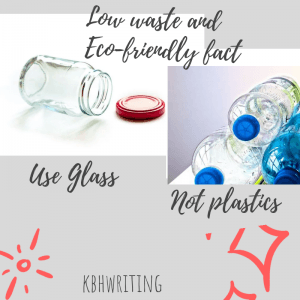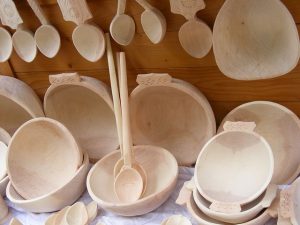Easy 51 low waste and Eco-friendly ideas for your kitchen
Living low waste can prevent thousands of products from heading to landfills and polluting the environment and oceans.
Living a more Eco-friendly and zero-waste lifestyle will also save you lots of money, ultimately, giving you a life of financial freedom that you so desperately Covet.
Zero waste also encourages a more sustainable economy where nothing is wasted,
Products are easily recycled to produce more healthier and needed tools for everyday living.
According to science, plastic materials are almost non-renewable and unsustainable compared to their glass counterparts, which ultimately leads to emission of carbon dioxide which disturbs the ecosystem.
While glass on the other hand is completely recyclable to make other newer glass products.
Since glass is made of sand, soda, ash, limestone and other recycled glass, they produce less toxic emissions when trashed in landfills if no longer in use, which is rarely.
Embracing a low waste and sustainable lifestyle is the best way to save our ecosystem and help us live a more healthier lives.
Ready to join the movement?
You can as well start with your kitchen-
51 Low Waste and Eco-friendly Ideas For Your Kitchen.
How to Clean Kitchen Sink Faster
Here are 51 Low waste and Eco-friendly ideas for your kitchen
Buy garlic, pepper, onions and spices in bulk, dry & grind and bottle-preserve them to save your money and to reduce trash.
Don’t dispose your coffee grounds. You can use your coffee grounds to make an effective body scrub and stretch mark removal scrub.
Stop buying dishwashers. Dishwasher are plastic or rubber. It is much wiser to consider making one if you wish to go waste free.
Send your groceries and item packaging materials like cartons, wrappers, foils, nylon to the recycling firms in order to help them produce more useful products.
Use spoiled food to make a small compost garden where you plant your own vegetables instead of tossing them away.
Don’t toss overripe fruit away. Use them to make healthy fresh juice, sweet syrups, salad dressing or for baking small chops.
Use glass jam bottles and prickle glass to store food instead of rubber or plastics.

Use natural sunlight to dry food products instead of oven drying.
Save money on light bills by turning off your microwave and oven when not in use.
Use a grocery list when shopping for your pantry to avoid buying unnecessary things you won’t even cook.
Cook meals in bulk like soup, stews, and sauce to save money and your human energy.
Grow your tomatoes, peppers and minor vegetables.
Declutter your kitchen often to rid off broken things like plastic cups, spoons, plates, basins and electronics.
Save gas by turning it off or low in between cooking.
Save more gas by turning on your cooking gas only when you are ready to cook.
Make your fruit juice instead of buying to minimize plastic and aluminum waste.
Use a meal plan to make cooking easier and prevent food waste due to indecision.
Organize your freezer in such a way that it is easily accessible to minimize expenses buying food items you already have and waste.
Save more water by turning off taps when not in use or in between washing.
Have good storage system in your kitchen to minimize waste due to poor organization.
Make your own spices and preserve instead of buying all the time.
Don’t cook due to boredom until you are absolutely sure you want to eat.
Don’t buy plastic lunch bags for kids, instead opt for metal and fabric made ones.
Don’t use plastic or rubber food flasks and spoons for your kids, buy metal and wood , or glass instead.

Be actively present while cooking to preserve food waste and air pollution.
Stop buying things around the kitchen until you are absolutely sure you need them.
Store your grains in glass jar and aluminum to minimize food spoilage due to improper storage.
Occasionally air dry your raw grains like rice, beans, millet, maize to prevent unexpected spoilage.
Have a proper storage for dishes to minimize spoilage and unnecessary loss due to poor organization.
Save money in buying proteins like meat, fish or chicken by buying them in bulk, oven dry them and then refrigerate for easy use.
Buy only the food items you use to minimize food waste and pollution.
Cook smaller portions of food according to family needs.
Re-purpose left over soup, stews or sauce into other tasty meals instead of tossing them away.
Use a monthly budget for your grocery shopping to minimize food waste and save your hard earned money.
Drink more water instead of fresh juice or soda to stay healthy, slim and waste-free.
Watch portion size by using smaller bowls and eating mindfully one bit at a time.
Buy greens in smaller quantities to avoid waste.
Don’t use the air conditioner in your kitchen to save energy and light bills.
Occasionally clean up kitchen walls to keep environment neat and healthy.
Avoid using curtains in the kitchen, use Aluminium blinds instead should in-case of fire.
Occasionally check leakage in gas cylinders to save money in buying gas or gas pollution and fire.
Occasionally check gas knobs to ensure they are all turned off and in place to avoid fire accidents and injury.
Buy cooking gas with alerts when it mistakenly goes on or when your kid put it on mindlessly.
Buy a taller cooking gas that stays a few inches above the reach of children.
Mend broken floors, slabs or cabinets to avoid injury and avoidable accidents.
Avoid shopping overripe foodstuffs in large quantities to minimize eventual waste.
Use orange peels to make enzymatic cleaners rather than trashing them to stay zero-waste and live more intentional.
Ditch disposable paper towels or tissue by using soft and thick cotton towels for cleaning spills or any other spill around the kitchen.
Stop using the nylon-cling-wrap to cover food. Simply make cotton rags from old garments to cover cooked food or use plate to cover food.
Stop shopping with plastic bags make one with easily washed stylish reusable and environment-friendly fabric
Don’t use plastic food storage containers, use deep glass jars or bottles instead.
Use wooden utensils instead of plastics or rubber.
51 Low Waste and Eco-friendly Ideas For Your Kitchen.
In other, plain-simple words, zero waste kitchen can transform our lives positively and protect our planet earth from pollution and harming us with dangerous toxins.
A zero-waste life will keep waste away from landfills, incinerators and consequently the oceans, which will help reduce GHG emissions and climate pollution.
If you enjoyed this post, please share with a loved one. Sharing is caring!
LETS JOIN HANDS TO MAKE OUR ECO-SYSTEM HEALTHIER!
101 Ways to Get Seriously Organized ( More Eco-friendly and Sustainable)
Let’s start a conversation below!
Are you already living zero waste or low waste?
What do you think about the movement?
Are you ready to join now?
Or why do you think you may not be able to join?
51 Low Waste and Eco-friendly Ideas For Your Kitchen.
